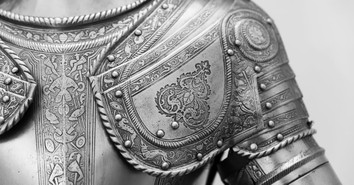The Relational Economy: Investing - Part 2

It should be no surprise that God sent Hosea to love the prostitute Gomer. After all, "There is no one righteous, not even one; there is no one who understands, no one who seeks God. All have turned away, they have together become worthless; there is no one who does good, not even one." (Romans 3:10-12). If you believe this, it makes perfect sense that Hosea was called to love Gomer since we are all Gomer.
Perhaps something inside you has taken Rom. 3:10-12 to mean that other person who has sinned so grossly. Perhaps you imagine that it hardly includes you. If you have attached your worth to the good things you have done or the sins you have avoided, you are living by works. If it were true that the good things we do establish and maintain our value before God and people, then works are what matter most. If works are what matter most, then grace is no longer grace.
But look again. Romans 3:10-12 is not cloudy in its meaning. It leaves no room for our exceptions. Its declaration is clear.
"… no one righteous… "
"… not even one…"
"… no one … understands …"
"… no one … seeks …"
"… all have turned away…"
"… they have together become worthless …"
"… no one … does good …"
"… not even one."
If you can fit your name between these lines for special favor, I will be impressed. It is a bleak and stark reality designed for a beautiful purpose. It is a sour and nasty medicine designed to prepare our souls for the sweetness of grace.
If Gomer can stand beside the best of saints with her head held high, then hurray for grace. If Gomer can expect the most godly of men to come and woo her, then hurray for grace. If someone as failing as David can be held up as an exemplar king, then hurray for grace. Then we all have reason to rejoice.
Under works there is "no one righteous,"
but by grace everyone can be made righteous (Romans 5:19).
Under works there is "not even one,"
but by grace everyone who believes (John 3:16).
Under works "no one … understands,"
but through grace our minds are renewed (Romans 12:2).
Under works "no one … seeks God,"
but grace crucifies our sinful desires (Galatians 5:24).
Under works "all have turned away…"
but by grace we are called to belong to Christ (Romans 1:6).
Under works we have all "together become worthless"
but by grace we are all made worthy (Ephesians 4:1).
Under works "no one … does good …"
but by grace we are saved unto good works (Ephesians 2:10).
Under works "not even one" will be saved,
but Grace calls out …
"Come to me, all you who are weary and burdened, and I will give you rest. Take my yoke upon you and learn from me, for I am gentle and humble in heart, and you will find rest for your souls. For my yoke is easy and my burden is light" (Matthew 11:28).
I am Gomer!
You are Gomer!
When that person you admire for their godliness comes your way, do not consider your works alone and find yourself unworthy. Consider the grace of a God who not only saves but also "forgive[s] us our sins and purif[ies] us from all unrighteousness" (1 John 1:9).
I am Gomer!
You are Gomer!
Gomer, the prostitute and later adulteress had NOTHING to bring to the relationship with Hosea but her sins. She could not flaunt her good deeds, because she knew they were but "filthy rags" (Isaiah 64:6). She was loved because, God who is love, sent Hosea to love her. She was worth the investment because God is in the business of making saints not finding them.
I am Gomer!
You are Gomer!
God is prepared to MAKE you worth the investment not through your works but through grace. And if it is by grace "then it is no longer by works; if it were, grace would no longer be grace" (Romans 11:6).
What God said to Hosea was, "Take Gomer and love her." Yes, in the background is the larger narrative of a nation and its God, but THIS IS A LOVE STORY like no other. The happily ever after comes later at Calvary.
If you are like Gomer—beaten down by life—you may find yourself asking, "Why did I give myself to someone like that, someone so low?" Why? Perhaps because there were no other offers. Why? Perhaps the other offers were even worse. It could also be because you thought your failings, your own unfaithfulness, qualified you for nothing more. Perhaps you thought that was all your sins could afford. If that is true, come and this time spend from your grace account. You can afford a great deal more.
God does not find the worthy and call them his own. They do not exist. God finds the prostitutes, spiritual or otherwise, and makes them his own. He loves them. His investment is holistic and ultimately extending to his son on the cross.
He said of unfaithful Israel: "I will take you for my wife forever; I will take you for my wife in righteousness and justice, in love and compassion. I will take you for my wife in faithfulness, and you will acknowledge the LORD" (Hosea 2:19-20). He works in clay to make what he will, but occasionally he takes stone, rough stone and hews it until it resembles his Son. Then he puts hIS name on it and calls it—Beautiful.
We are Gomer.
We are Israel.
We are loved and we are beautiful.
God says, "I am now going to allure her; I will lead her into the desert and speak tenderly to her" (Hosea 2:14). The desert was where Israel first encountered their God, the place of their first love. In the desert God was Israel's only hope. He was food and water, protection and comfort. He was their hope.
What a beautiful message. God does not simply shout from heaven but carefully, delicately, tenderly, allures those He loves. He is investing his time, energy, creativity, and love in us. Accept nothing less from anyone.
Say it loud and with pride, "I am Gomer the loved." 
Got feedback? Send your comments and questions to Hudson at hudsondavis@streamsinthewilderness.com. If you don't hear back within a few days' time, please try again. Hudson would like to respond to all reader feedback.
Or become a fan of "Streams in the Wilderness" on Facebook here: Streams In The Wilderness
**This article first published on July 15, 2010.
Originally published July 15, 2010.





